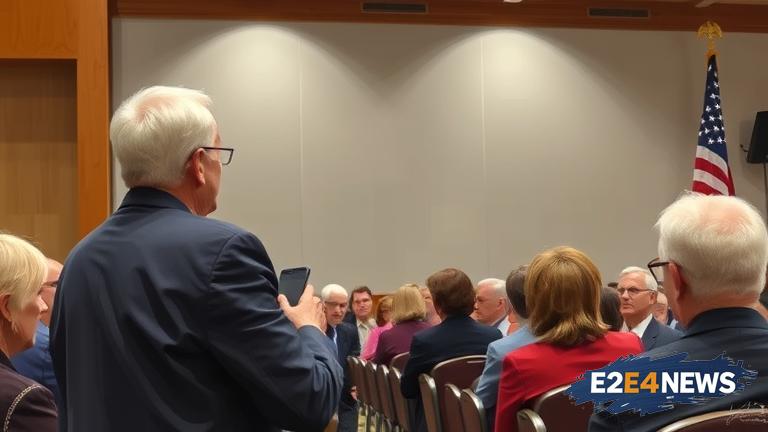A recent town hall meeting in Nebraska turned contentious when a Republican representative was met with loud boos and criticism from attendees over proposed cuts to the Supplemental Nutrition Assistance Program (SNAP). The representative, who has been a vocal supporter of reducing government spending, was attempting to explain the reasoning behind the proposed cuts, but was repeatedly interrupted by audience members who expressed concerns about the impact on low-income families. The SNAP program, which provides food assistance to millions of Americans, has been a target of Republican lawmakers who argue that it is too expensive and inefficient. However, many Democrats and advocates for the poor argue that the program is essential for helping families put food on the table. The town hall meeting, which was attended by over 100 people, was held at a local community center and was intended to provide a forum for constituents to express their concerns and ask questions. However, the meeting quickly turned heated, with many attendees expressing outrage and frustration over the proposed cuts. One attendee, who identified herself as a single mother, spoke about how the SNAP program had helped her family during a difficult time, and pleaded with the representative to reconsider the proposed cuts. Another attendee, who was a local business owner, argued that the SNAP program was not only essential for low-income families, but also helped to boost the local economy. Despite the backlash, the representative remained defiant, arguing that the proposed cuts were necessary to reduce government spending and promote economic growth. However, many attendees were unconvinced, and the meeting ended with a sense of tension and uncertainty. The proposed cuts to SNAP have been a source of controversy in recent months, with many lawmakers and advocates arguing that they would have a devastating impact on low-income families. The SNAP program, which is administered by the US Department of Agriculture, provides food assistance to over 40 million Americans, including children, seniors, and people with disabilities. The program has been shown to be highly effective in reducing hunger and poverty, and has been praised by many as a vital lifeline for families in need. However, some lawmakers have argued that the program is too expensive and inefficient, and have proposed cuts to reduce costs. The proposed cuts, which would affect over 1 million Americans, have been met with widespread criticism from Democrats and advocates for the poor. Many have argued that the cuts would have a disproportionate impact on vulnerable populations, including children, seniors, and people with disabilities. The controversy over SNAP cuts has highlighted the deep divisions in Washington over issues of poverty and inequality. While some lawmakers argue that the program is essential for helping families in need, others see it as a symbol of government waste and inefficiency. The debate over SNAP cuts is likely to continue in the coming months, with many lawmakers and advocates pushing for alternative solutions to reduce poverty and promote economic growth. In the meantime, many low-income families are left wondering how they will make ends meet if the proposed cuts go into effect. The town hall meeting in Nebraska was just one example of the growing backlash against the proposed cuts, and it remains to be seen how lawmakers will respond to the concerns of their constituents. As the debate over SNAP cuts continues, one thing is clear: the program remains a vital lifeline for millions of Americans, and any attempts to cut it will be met with fierce resistance. The proposed cuts have also raised concerns about the impact on local economies, as SNAP benefits are often spent at local grocery stores and other businesses. Many business owners have argued that the SNAP program is essential for boosting local economies, and that cuts to the program would have a devastating impact on their businesses. The controversy over SNAP cuts has also highlighted the need for alternative solutions to reduce poverty and promote economic growth. Many lawmakers and advocates have proposed alternative solutions, such as increasing funding for job training programs and promoting economic development in low-income communities. However, these solutions have been met with skepticism by some lawmakers, who argue that they are too expensive or ineffective. As the debate over SNAP cuts continues, it remains to be seen what solutions will be proposed and implemented. One thing is clear, however: the SNAP program remains a vital lifeline for millions of Americans, and any attempts to cut it will be met with fierce resistance.





